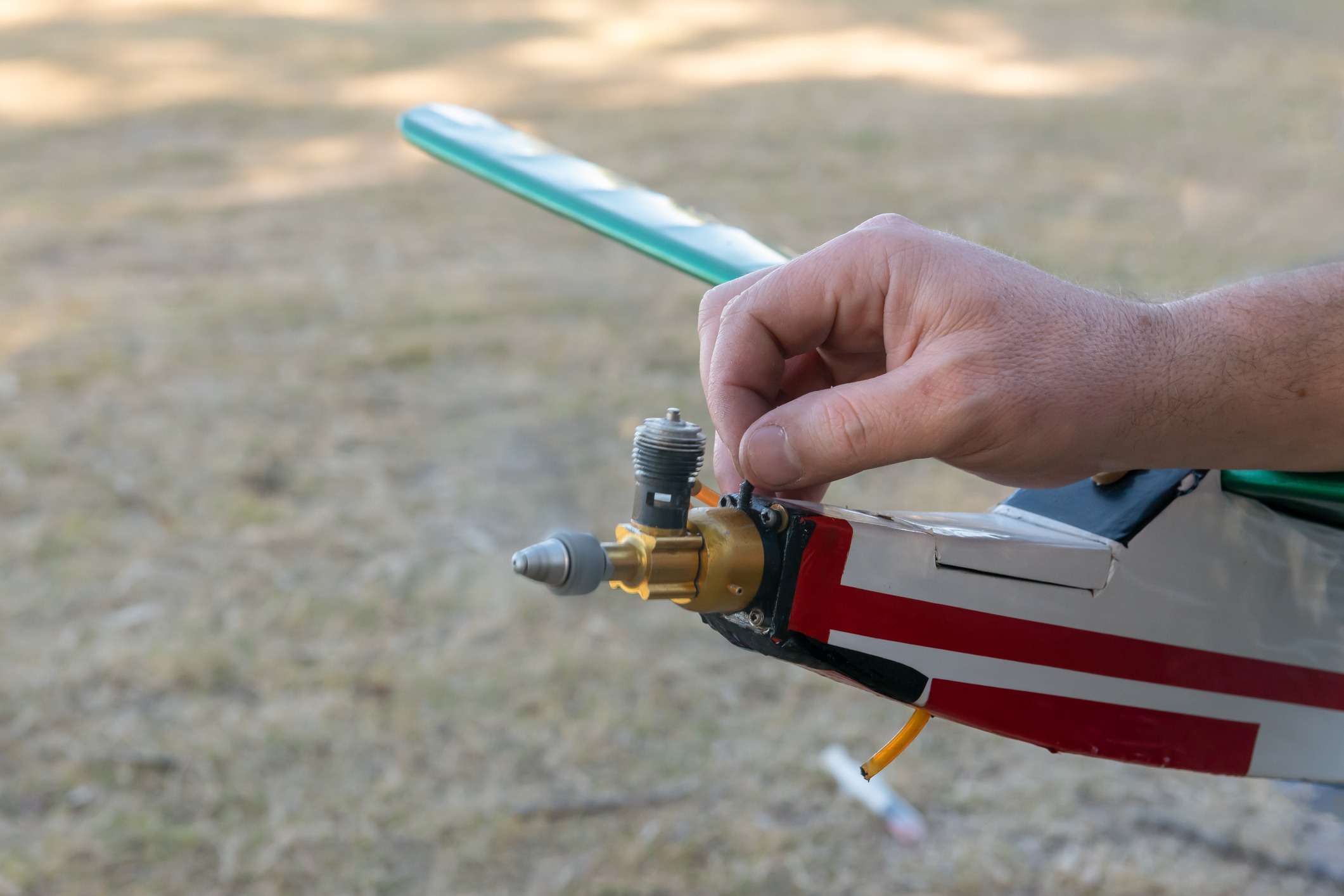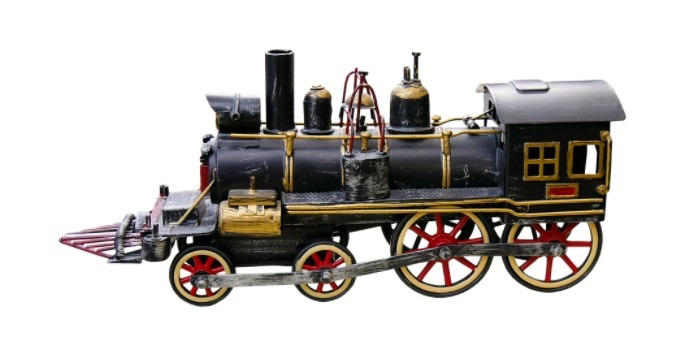Understanding RC Sizes and Which Is Most Popular
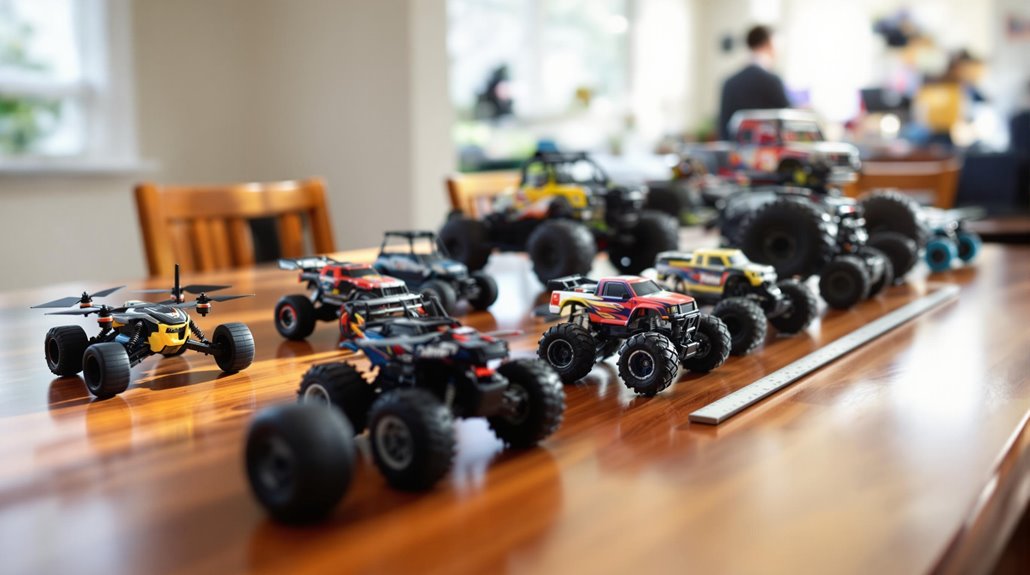
Understanding RC sizes is crucial in selecting the right model for your needs. You'll find common scales like 1/10, 1/8, and 1/24, each tailored for different experiences. The 1/10 scale is the most popular, balancing performance and portability, making it great for outdoor and off-road racing. If you're looking for something smaller, the 1/18 scale is perfect for casual use, while 1/24 is ideal for tight spaces. Each scale has its strengths, and the right choice depends on where you plan to race and your experience level. Stick around, and you'll discover even more about picking the perfect RC car.
Key Takeaways
- RC car scales represent the size ratio of the model to the actual vehicle, with common scales including 1/10, 1/8, and 1/24.
- The 1/10 scale is the most popular choice, balancing performance, transportability, and versatility for various racing scenarios.
- Smaller scales like 1/18 and 1/24 are ideal for casual users and indoor racing, appealing to beginners and those with limited space.
- Larger scales, such as 1/5 and 1/8, excel in off-road performance, offering stability and durability for rugged terrains.
- Battery life and performance vary by scale; larger cars generally have longer run times due to higher capacity batteries.
Overview of RC Car Scales
When you dive into the world of RC cars, understanding their scales is crucial for making the right choice. RC car scales represent the ratio between the size of the model and the actual vehicle. Popular RC car sizes include the 1/10 scale, 1/8 scale, and smaller 1/24 scale. A 1/10 scale means your RC car model is one-tenth the size of the real car, typically measuring around 17.5 to 19.5 inches in length, making it versatile for both on-road and off-road racing.
If you're considering larger scales like 1/5 and 1/8, these models are designed for extreme terrains and provide more stability and detail, with 1/5 models averaging 30 to 40 inches. On the other hand, smaller scales, like 1/24, average 7 to 9 inches in length, making them perfect for tight spaces and ideal for beginners and indoor racing. Generally, electric RC cars are favored for their ease of use and lower maintenance, especially among beginners who are navigating different scales for the first time.
Understanding the different scale RC cars helps you select the right model based on your performance needs and available space. This comprehensive guide to RC car scales will ensure you make an informed choice that fits your preferences and requirements.
Popular RC Scale Sizes
Exploring popular RC scale sizes reveals a variety of options tailored to different preferences and racing environments. Among the most sought-after are the 1/10 scale, 1/8 scale, and 1/5 scale RC vehicles. The 1/10 scale is the most popular, balancing performance and transportability with lengths ranging from 17.5 to 19.5 inches. This scale offers many vehicle types, including both on-road and off-road options, making it an excellent choice for diverse users. When selecting a scale, consider battery types as they can influence the performance and runtime of your RC vehicle.
If you're into competitive racing, the 1/8 scale, measuring about 19 to 24 inches long, might catch your interest. These models are known for their durability and exceptional off-road capabilities, making them perfect for challenging terrains. For those who prefer larger RC car sizes, the 1/5 scale stands out with lengths of 30 to 40 inches, designed for extreme terrains and enhanced durability.
If you're just starting, smaller scales like the 1/24, typically from 7 to 9 inches, are excellent for limited spaces and entry-level hobbyists. Each of these popular RC scale sizes offers unique features, ensuring you find the perfect fit for your racing style.
Advantages of Different Scales
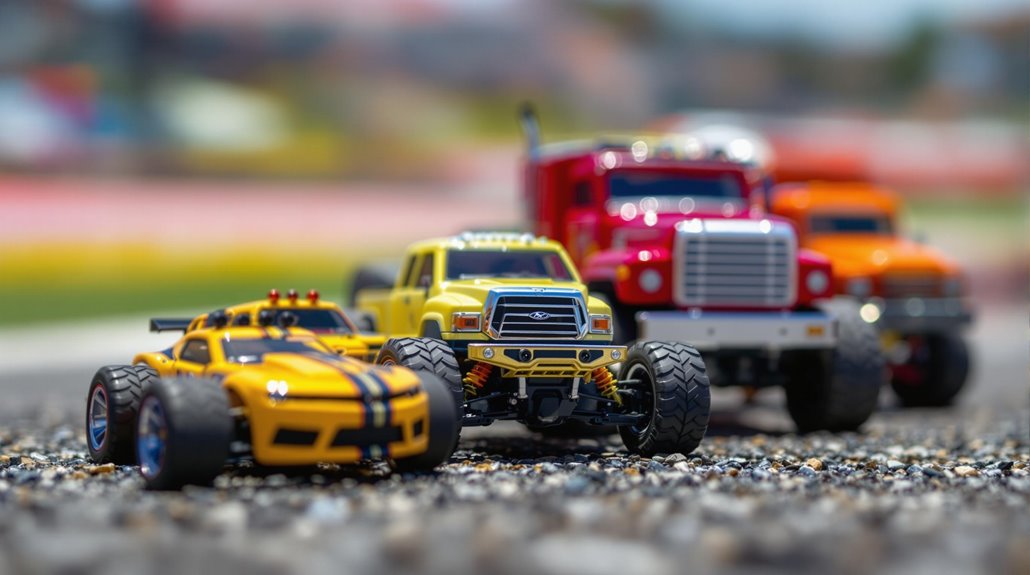
Each RC scale offers distinct advantages that cater to different preferences and racing environments. Choosing the right one can enhance your experience and performance on the track. Here's a quick look at the benefits of various scales:
- 1/10 Scale: The most popular RC car, it balances size and performance, making it versatile for various settings.
- 1/24 Scale: Perfect for limited spaces, these compact models are easy to transport, ideal for casual racing or play.
- 1/8 Scale: Known for durability, they excel in off-road racing, providing impressive speed and torque in the great outdoors.
- 1/16 Scale: Compact and agile, these cars deliver surprising performance in tighter environments, making them fun for indoor tracks.
- 1/5 Scale: The largest option, designed for extreme terrains, offers a highly realistic driving experience, though they require more storage and investment.
- When considering power sources, electric cars are more reliable and eco-friendly compared to nitro-powered options, which are noisier and require maintenance.
Determining the Right Scale
Choosing the right RC scale can make all the difference in your experience, whether you're racing on a track or enjoying some casual playtime. The most popular scale for RC cars is 1/10, offering a great balance of size, performance, and variety. These models typically measure between 16 to 20 inches in length, fitting well in most spaces. When you're deciding, consider your available space.
Larger models, like 1/5 scale, need more room to maneuver, while smaller scales, such as 1/24, excel in tight areas. Your budget plays a crucial role too; larger scales often have higher price points due to their complexity and features, while smaller scales are generally more affordable. Additionally, think about your intended use. Are you focused on indoor racing, outdoor terrain, or simply displaying model vehicles? Each scale has unique performance characteristics, with larger models delivering more speed and torque, while smaller scales emphasize agility and maneuverability. Aesthetic design can add to the excitement but is secondary to function, ensuring that the primary focus remains on performance and suitability.
By weighing these factors, you can confidently choose the right RC car scale that suits your needs and preferences.
Performance Comparisons by Scale
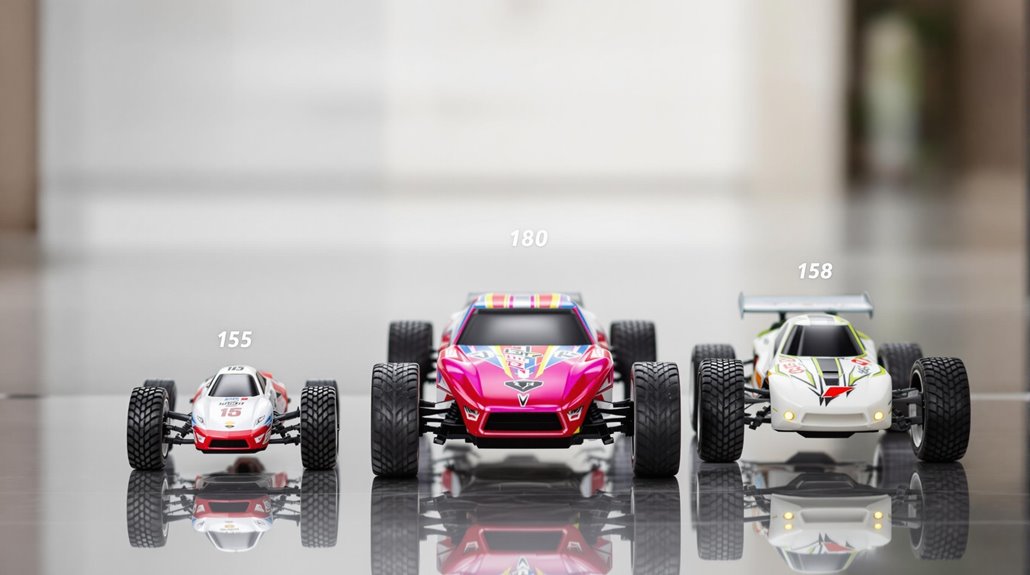
Comparing performance across different RC scales reveals significant differences that can impact your driving experience. Each RC car size offers distinct advantages depending on your preferences and intended use. Here's a quick overview:
- 1/10 Scale: Popular for competitive racing, speeds of 30-40 mph (48-64 km/h).
- 1/8 Scale: Larger, heavier models that excel in off-road performance, providing excellent stability and handling.
- 1/5 Scale: Impressive durability; powerful engines offer greater torque for extreme conditions.
- Smaller Scales (e.g., 1/24): Speed-focused, achieving 15-25 mph (24-40 km/h), perfect for indoor racing and beginners.
- Larger Scales: Emphasize stability and durability, making them ideal for rugged terrains.
The Traxxas XO-1 is an example of a high-performance RC car that prioritizes speed, reaching up to 100 MPH, showcasing the potential of RC vehicles in terms of velocity.
When you choose scale RC cars, consider how speed, durability, and off-road performance align with your driving style. Smaller scales deliver agility and speed, while larger scales enhance stability and robustness. Understanding these performance comparisons helps you select an RC car that fits your needs, whether you're racing on a track or navigating challenging landscapes.
Tips for RC Car Selection
Understanding the different scales of RC cars sets the stage for making an informed selection. When choosing your RC car, consider the popular scale of 1/10. This scale strikes a balance between performance and portability, making it an excellent choice for many enthusiasts. Think about your environment: larger scales like 1/5 excel outdoors, while smaller scales such as 1/24 are perfect for indoor spaces.
Your budget is critical, too. 1/10 scale vehicles typically range from $150 to $250, which offers a good balance of quality and affordability. Assess your skill level; beginners often find 1/10 scale models easier to navigate, thanks to their manageable speed and control. Finally, don't forget about customization. Ensure the model you choose has compatible accessories available, as this allows for future upgrades and personal touches.
By considering the scale, performance, portability, budget, skill level, and customization options, you'll be well-equipped to select the perfect RC car tailored to your needs. It's also important to consider battery life impacts as it affects playtime and performance, ensuring longer enjoyment of your RC car.

